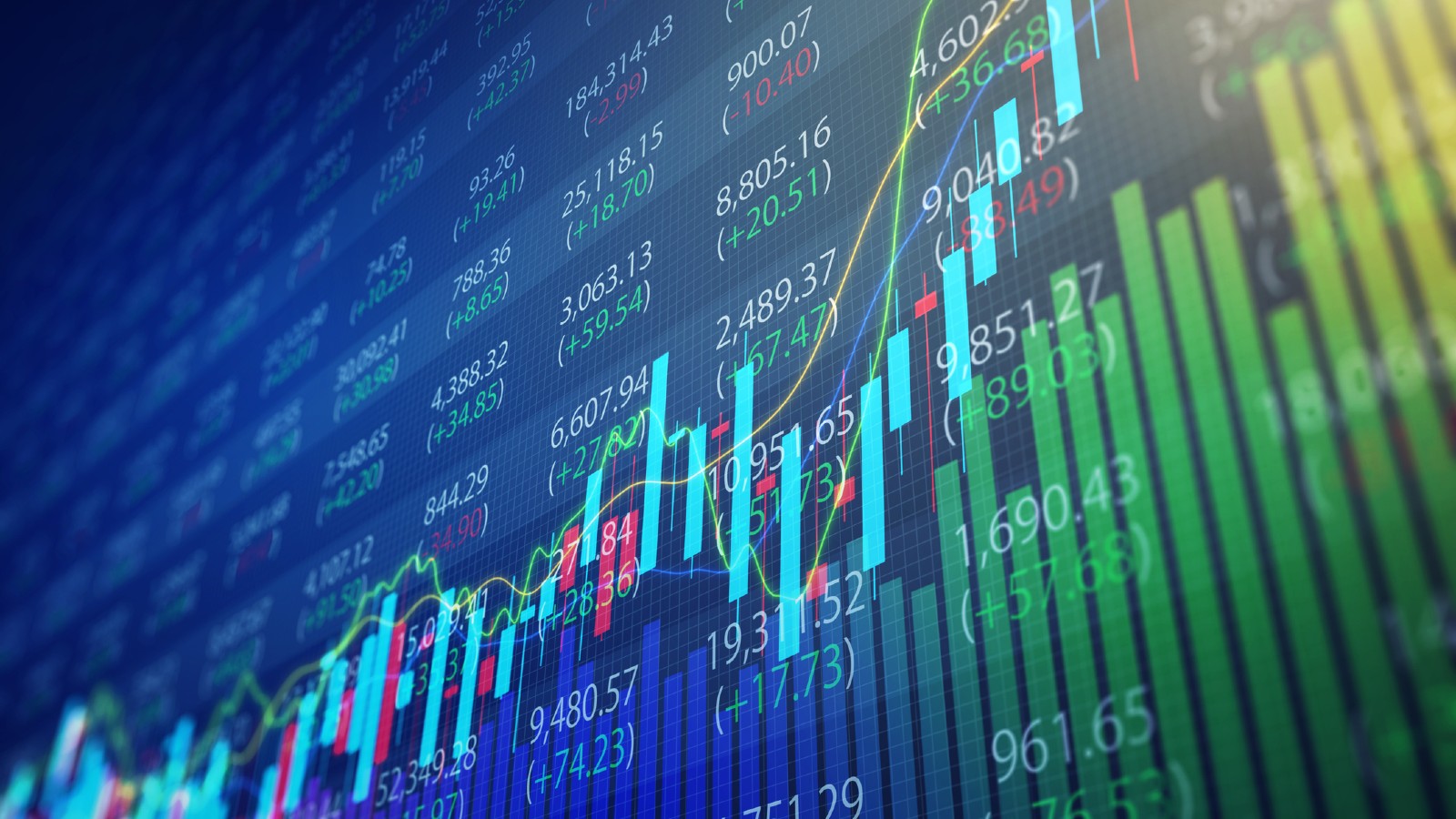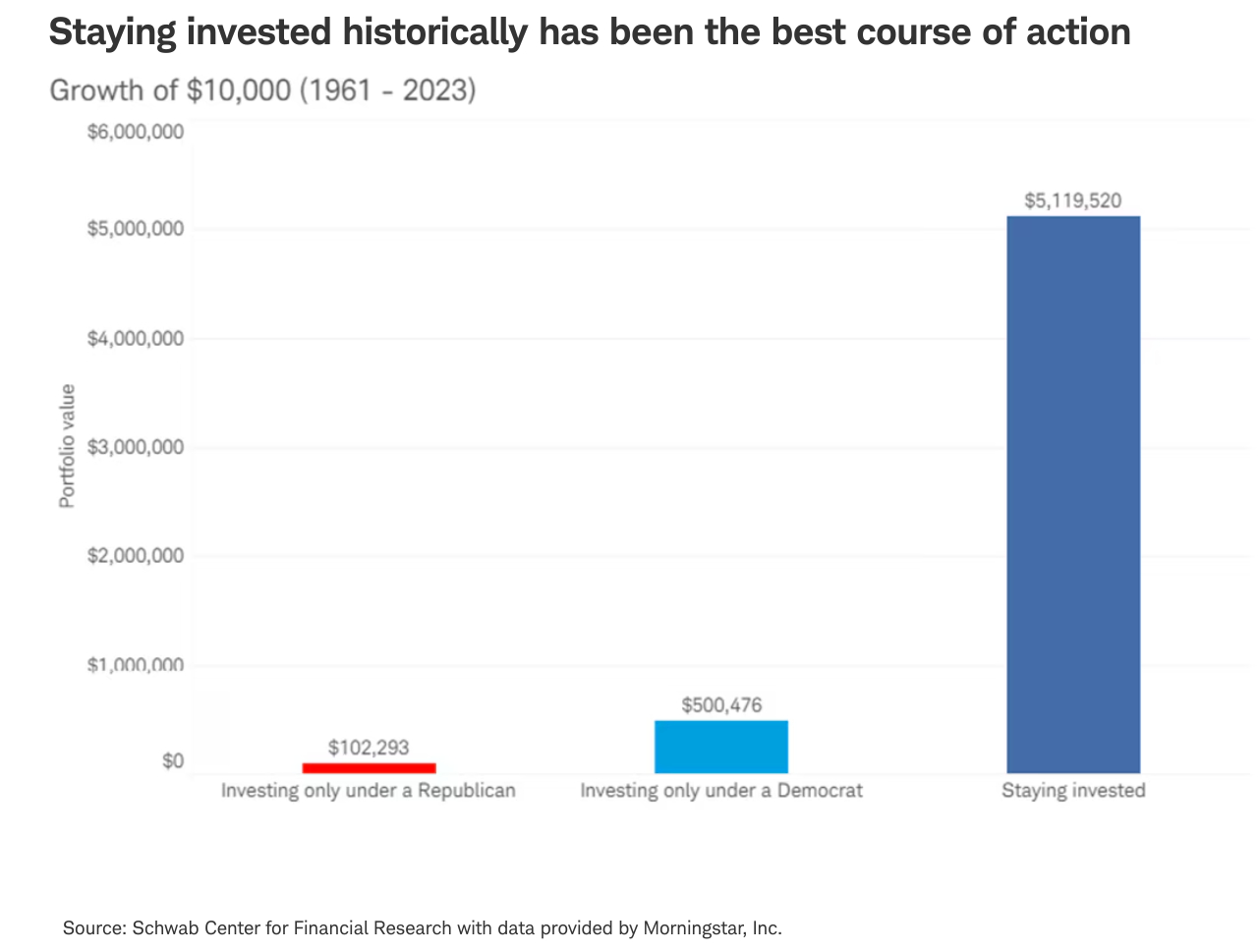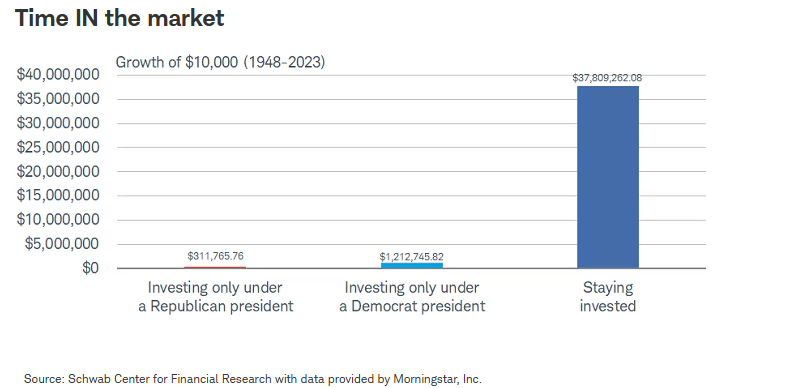Stocks Rally on Election Day as Markets Brace for Volatility
All three major indexes opened higher as voters chose the 47th President of the United States.


Profit and prosper with the best of Kiplinger's advice on investing, taxes, retirement, personal finance and much more. Delivered daily. Enter your email in the box and click Sign Me Up.
You are now subscribed
Your newsletter sign-up was successful
Want to add more newsletters?

Delivered daily
Kiplinger Today
Profit and prosper with the best of Kiplinger's advice on investing, taxes, retirement, personal finance and much more delivered daily. Smart money moves start here.

Sent five days a week
Kiplinger A Step Ahead
Get practical help to make better financial decisions in your everyday life, from spending to savings on top deals.

Delivered daily
Kiplinger Closing Bell
Get today's biggest financial and investing headlines delivered to your inbox every day the U.S. stock market is open.

Sent twice a week
Kiplinger Adviser Intel
Financial pros across the country share best practices and fresh tactics to preserve and grow your wealth.

Delivered weekly
Kiplinger Tax Tips
Trim your federal and state tax bills with practical tax-planning and tax-cutting strategies.

Sent twice a week
Kiplinger Retirement Tips
Your twice-a-week guide to planning and enjoying a financially secure and richly rewarding retirement

Sent bimonthly.
Kiplinger Adviser Angle
Insights for advisers, wealth managers and other financial professionals.

Sent twice a week
Kiplinger Investing Weekly
Your twice-a-week roundup of promising stocks, funds, companies and industries you should consider, ones you should avoid, and why.

Sent weekly for six weeks
Kiplinger Invest for Retirement
Your step-by-step six-part series on how to invest for retirement, from devising a successful strategy to exactly which investments to choose.
Stocks gapped higher at the opening bell Tuesday as Americans headed to the polls to decide another closely contested presidential election.
The long run-up to the election had traders and tacticians attempting to discount the outcome's potential impact on the prices of various asset classes as well as the future health of the economy. The so-called Trump trade is just one example of this activity.
Happily, retail investors are better served by not participating in this arguably neurotic behavior. That's because, when it comes to long-term investing, it doesn't matter which party holds the White House.
From just $107.88 $24.99 for Kiplinger Personal Finance
Become a smarter, better informed investor. Subscribe from just $107.88 $24.99, plus get up to 4 Special Issues

Sign up for Kiplinger’s Free Newsletters
Profit and prosper with the best of expert advice on investing, taxes, retirement, personal finance and more - straight to your e-mail.
Profit and prosper with the best of expert advice - straight to your e-mail.
But let's get back to Tuesday's action, which took place perhaps days before the winner of the election will be confirmed. Markets are thought to provide a real-time indicator of the candidates' perceived chances of winning the Electoral College.
Although it's wise to heed market signals, this does not make them crystal balls.
At mid-session, the blue chip Dow Jones Industrial Average was up more than 400 points, or 1%, at 42,199. The broader S&P 500 gained 1.1%, while the tech-heavy Nasdaq Composite rose 1.4%.
All 11 sectors of the S&P 500 were higher, led by consumer discretionary, industrials and tech. As per usual, the tech sector was driven by Magnificent 7 stocks, most notably Nvidia (NVDA) and Tesla (TSLA).
In case anyone missed it, Nvidia was added to the Dow Jones Industrial Average on Monday, effective November 8. Tesla, helmed by noted Trump advocate Elon Musk, has always been a volatile stock. TSLA's five year-beta stands at 2.3, and its all-time maximum drawdown is 73%.
It's not unreasonable to be skeptical of TSLA stock's predictive value on a day like today.
The bottom line
"There is no clear consensus around the important questions of 'who will be President' and/or 'which party will control the House and Senate,'" write Nicholas Colas and Jessica Rabe, co-founders of DataTrek Research. "No matter the outcomes, therefore, they will be a surprise to many market participants."
What does that mean? For retail investors, there is no trade here. And while today's market action will offer some signal, it will also put out a lot of noise. So sit tight. It has long been established that time in the market is far more important than timing the market.
Have a look at the below chart, courtesy of the Schwab Center for Financial Research. Staying invested no matter which party runs Washington has proven to be a superior method for creating wealth.

But wait, there's more. Here's another chart from Schwab illustrating the same point going all the way back to 1948.

As for where the market goes from here?
Let's hear from DataTrek again: "The market setup going into Election Day 2024 is one where 1.) Tech drives the S&P much more than in 2016 and 2020; 2.) stocks are evaluating a significant acceleration in earnings growth in the next three to four quarters; and 3.) expected volatility is unusually elevated relative to prior bull market elections."
The real kicker, however, is that the market setup would arguably be the same even if it weren't an election year, DataTrek says.
Markets might prefer some outcomes to others, but they more or less accept reality and then try to figure out how that reality will change in the future. Good luck with that. Happily, the long-term trend for U.S. equities has always been up and to the right.
In the meantime, traders and tacticians will just have to wait like the rest of us normies. Retail investors, as always, would do well to stay frosty.
Related content
- Best Dividend Stocks to Buy for Dependable Dividend Growth
- Best Stocks of the Bull Market: Buy, Sell or Hold?
- What Stocks Are Politicians Buying and Selling?
Profit and prosper with the best of Kiplinger's advice on investing, taxes, retirement, personal finance and much more. Delivered daily. Enter your email in the box and click Sign Me Up.

Dan Burrows is Kiplinger's senior investing writer, having joined the publication full time in 2016.
A long-time financial journalist, Dan is a veteran of MarketWatch, CBS MoneyWatch, SmartMoney, InvestorPlace, DailyFinance and other tier 1 national publications. He has written for The Wall Street Journal, Bloomberg and Consumer Reports and his stories have appeared in the New York Daily News, the San Jose Mercury News and Investor's Business Daily, among many other outlets. As a senior writer at AOL's DailyFinance, Dan reported market news from the floor of the New York Stock Exchange.
Once upon a time – before his days as a financial reporter and assistant financial editor at legendary fashion trade paper Women's Wear Daily – Dan worked for Spy magazine, scribbled away at Time Inc. and contributed to Maxim magazine back when lad mags were a thing. He's also written for Esquire magazine's Dubious Achievements Awards.
In his current role at Kiplinger, Dan writes about markets and macroeconomics.
Dan holds a bachelor's degree from Oberlin College and a master's degree from Columbia University.
Disclosure: Dan does not trade individual stocks or securities. He is eternally long the U.S equity market, primarily through tax-advantaged accounts.
-
 Dow Adds 1,206 Points to Top 50,000: Stock Market Today
Dow Adds 1,206 Points to Top 50,000: Stock Market TodayThe S&P 500 and Nasdaq also had strong finishes to a volatile week, with beaten-down tech stocks outperforming.
-
 Ask the Tax Editor: Federal Income Tax Deductions
Ask the Tax Editor: Federal Income Tax DeductionsAsk the Editor In this week's Ask the Editor Q&A, Joy Taylor answers questions on federal income tax deductions
-
 States With No-Fault Car Insurance Laws (and How No-Fault Car Insurance Works)
States With No-Fault Car Insurance Laws (and How No-Fault Car Insurance Works)A breakdown of the confusing rules around no-fault car insurance in every state where it exists.
-
 Dow Adds 1,206 Points to Top 50,000: Stock Market Today
Dow Adds 1,206 Points to Top 50,000: Stock Market TodayThe S&P 500 and Nasdaq also had strong finishes to a volatile week, with beaten-down tech stocks outperforming.
-
 The Best Precious Metals ETFs to Buy in 2026
The Best Precious Metals ETFs to Buy in 2026Precious metals ETFs provide a hedge against monetary debasement and exposure to industrial-related tailwinds from emerging markets.
-
 For the 2% Club, the Guardrails Approach and the 4% Rule Do Not Work: Here's What Works Instead
For the 2% Club, the Guardrails Approach and the 4% Rule Do Not Work: Here's What Works InsteadFor retirees with a pension, traditional withdrawal rules could be too restrictive. You need a tailored income plan that is much more flexible and realistic.
-
 Retiring Next Year? Now Is the Time to Start Designing What Your Retirement Will Look Like
Retiring Next Year? Now Is the Time to Start Designing What Your Retirement Will Look LikeThis is when you should be shifting your focus from growing your portfolio to designing an income and tax strategy that aligns your resources with your purpose.
-
 I'm a Financial Planner: This Layered Approach for Your Retirement Money Can Help Lower Your Stress
I'm a Financial Planner: This Layered Approach for Your Retirement Money Can Help Lower Your StressTo be confident about retirement, consider building a safety net by dividing assets into distinct layers and establishing a regular review process. Here's how.
-
 Stocks Sink With Alphabet, Bitcoin: Stock Market Today
Stocks Sink With Alphabet, Bitcoin: Stock Market TodayA dismal round of jobs data did little to lift sentiment on Thursday.
-
 The 4 Estate Planning Documents Every High-Net-Worth Family Needs (Not Just a Will)
The 4 Estate Planning Documents Every High-Net-Worth Family Needs (Not Just a Will)The key to successful estate planning for HNW families isn't just drafting these four documents, but ensuring they're current and immediately accessible.
-
 Love and Legacy: What Couples Rarely Talk About (But Should)
Love and Legacy: What Couples Rarely Talk About (But Should)Couples who talk openly about finances, including estate planning, are more likely to head into retirement joyfully. How can you get the conversation going?